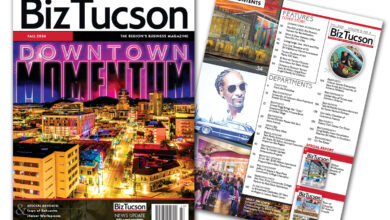
$500,000 for Pediatric Cancer Research
By Romi Carrell Wittman –
$500,000 for Pediatric Cancer Research
Funded by Hyundai Hope on Wheels and Jim Click
Think back to childhood and you likely fondly remember things like bike rides, hanging out with friends and sleepovers. But for a kid fighting cancer, childhood can mean endless hospital stays, pain, isolation and – worst of all – a loss of hope for the future.
Finding a cure for cancer has long been a top goal of medical researchers – yet just 4 percent of federal cancer research funding is designated for pediatric cancer. This means researchers must find funding from other sources, but after the Great Recession of 2008, many funding sources evaporated. That’s why programs like Hyundai Hope on Wheels are critically important to finding a cure for the many different forms of pediatric cancer.
In September, two pediatric oncologists and researchers at the University of Arizona Steele Children’s Research Center were chosen to receive grants totaling $400,000 from the national Hyundai Hope On Wheels program. Local Hyundai dealership owner Jim Click committed an additional $100,000.
The UA Steele Center is one of a select few facilities nationwide to receive the two grants offered by Hope on Wheels – the $250,000 Hyundai Scholar award, given to senior researchers in support of translational impact research, and the $150,000 Young Investigator Research Award to support innovative research by new and emerging researchers.
Dr. Emmanuel Katsanis, a leader in pediatric immunotherapy, received the 2015 Hyundai Scholar grant. Click also designated $50,000 of his donation to go to Katsanis, the Louise Thomas Endowed Chair in Pediatric Cancer Research.
Dr. Yi Zeng was awarded the Young Investigator grant and will continue research in the area of Pak2, a type of enzyme in cells, as a means of suppressing graft-versus-host disease complications in children suffering from high-risk leukemia. “Our long-term goal is to improve the outcome of children receiving allogeneic bone marrow transplants,” Zeng said.
“These kids are so sick,” Click said. “This research gives them and their families so much hope.” The remaining $50,000 of Click’s commitment will go to the Steele facility to be used for research as needed.
Zafar Brooks, executive director of the nonprofit Hyundai Hope on Wheels and a director at Hyundai, said funding for the program comes from Hyundai Motor America and more than 820 Hyundai dealers nationwide in the form of a small fee on dealer invoices.
“We’ve awarded $100 million since 1998,” he said, with some $670,000 awarded to the UA Steele Center over the years. “That doesn’t include the matching funds from Jim Click, which is maybe another $250,000.”
Established in 1992, the UA Steele Center is one of the prestigious Centers of Excellence within the UA College of Medicine. Under the leadership of Dr. Fayez K. Ghishan, researchers at the UA Steele Center are investigating a wide range of areas, including autism, gastrointestinal disorders, type 1 diabetes, autoimmune disorders, cancer and blood diseases, lung disease, and more.
The center receives grant support from many national funding agencies like the Centers for Disease Control and the National Institutes of Health, as well as many nonprofit agencies and foundations. Community philanthropy also makes up part of the Steele Center’s funding base.
“Dr. Ghishan is the most amazing man,” Click said. “He loves his patients and wants to make the Steele Center a world-class research facility. Ghishan and his team are wonderful.”
Brooks said that a number of the projects that received funding from Hyundai Hope on Wheels have gone on to make important advancements. “The work is to find cures and to improve the knowledge base. What we’re doing is making available a source of research funding that dried up during the 2008 recession. It’s a precious and reliable funding source that allows scientists to continue their work.”
He added that Hyundai Motor America and Hyundai dealers nationwide are united in their passion for the cause. “Hyundai is about solving big problems. Cancer affects the whole family – we want to do whatever we can to help improve in the care and find the cure for this disease.”





